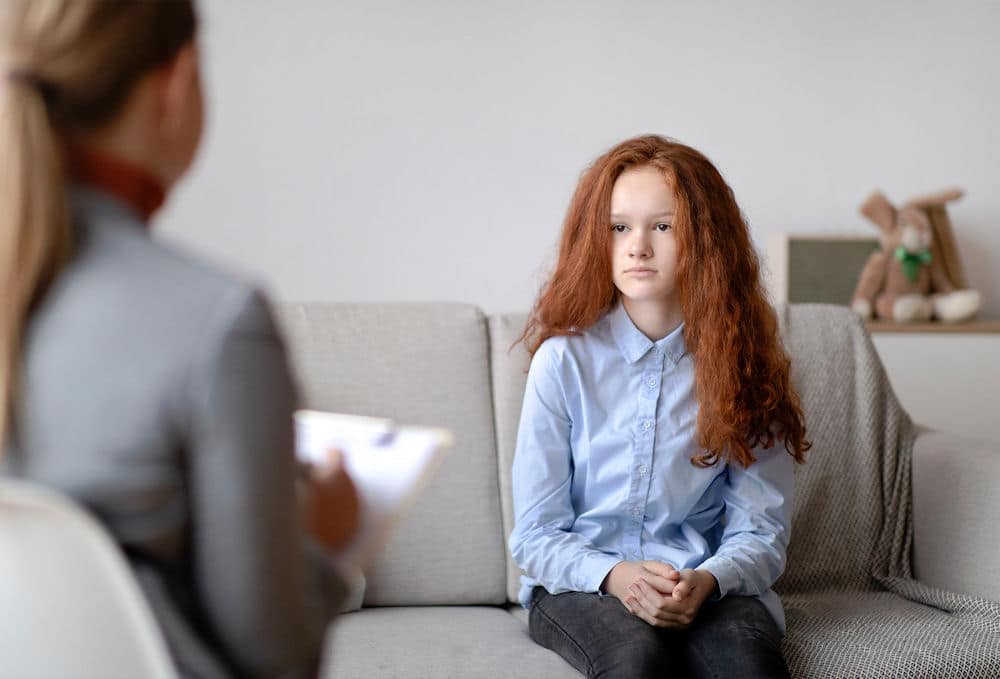Help for Parents of Addicts
Child’s addiction is a complex and heart-wrenching challenge for parents. It not only impacts the teen struggling with substance abuse but also disrupts family dynamics and creates intense emotional stress. As a parent, navigating this journey requires patience, education, and the right resources.
At Ambrosia in Port St. Lucie, Florida, we understand the challenges adolescents face with addiction and mental illness. We also understand how this disease affects all aspects of life, and how it commonly takes a toll on caregivers, known as caregiver burnout.
Therefore, we provide a guide that has been designed to provide you and your loved ones with the information necessary to help your child overcome addiction and support their long-term recovery. Learn more about the adolescent treatment services we offer at The Academy at Ambrosia.

Recognizing the signs and symptoms of addiction is crucial for parents to identify the problem early on. These signs may include changes in behavior, mood swings, withdrawal from social activities, and neglect of personal responsibilities. Understanding that addiction is a treatable condition is vital, and seeking professional help is the first step toward recovery. By educating themselves about the nature of addiction, parents can better support their child’s journey to a healthier life.
Helping Your Child With Substance Abuse
When helping a child with substance use disorder, the key is to recognize that they may be defensive or in denial. Offer them support rather than ultimatums, and let them know that you’re there to help them find solutions rather than punish them. Seek professional guidance from counselors, therapists, or addiction specialists to provide the necessary tools and strategies for recovery.
Teen Substance Abuse Statistics
Prescription drugs, including opioids and stimulants like Adderall, have become increasingly problematic, with teens gaining access through friends, family, or online. These statistics highlight the widespread nature of substance abuse and emphasize the importance of proactive parental involvement in addressing substance use disorders.
Talking to Kids about Addiction
To make the discussion more effective:
- Pick the right moment: Choose a calm time when neither you nor your child is angry or distracted. Avoid talking during a confrontation or crisis.
- Stay calm and non-judgmental: Your child may be afraid of your reaction, so maintain a composed tone. Avoid accusations and instead ask open-ended questions like, “Can you tell me why you’ve been using substances?”
- Listen actively: Give your child a chance to express themselves. This is not only about sharing your concerns but also about understanding what led them to substance use.
- Educate them: Many teens aren’t fully aware of the dangers of substance abuse. Gently provide information on the risks of drug and alcohol use, both short-term and long-term.
Signs My Child is Addicted to Drugs or Alcohol
- Behavioral Changes: Sudden drops in academic performance, loss of interest in activities they once enjoyed, skipping school, or changes in their friend group.
- Physical Symptoms: Bloodshot eyes, frequent nosebleeds (from snorting drugs), unexplained weight loss, and poor hygiene.
- Mood Swings: Irritability, aggressive behavior, anxiety, or depression can be signs of drug or alcohol use.
- Financial Irregularities: Missing money, asking for large sums of cash, or unexplained purchases can suggest substance use.
Recognizing these warning signs early can prevent further harm and guide you toward seeking help for your child’s addiction.
Why Is It So Important to Intervene in a Child’s Substance Abuse?
Additionally, teens who struggle with addiction are more likely to experience academic failure, legal issues, and strained relationships with family and peers. By intervening early, you can disrupt the cycle of addiction and give your child the best chance for a healthy and successful future through recovery training programs that provide scientific insights and non-confrontational strategies to support families.

Substance Abuse and Mental Illness in Kids
Treating both substance abuse and mental illness simultaneously is crucial for long-term recovery. A holistic approach that includes counseling, therapy, and, in some cases, medication is often necessary to address the root causes of addiction. Parents should seek professional guidance from specialists who understand how to manage co-occurring disorders in teenagers.
How to Help My Child Struggling with Substance Abuse
- Seek professional help – Reach out to addiction specialists, therapists, or support groups that focus on adolescent addiction and offer recovery training programs.
- Set boundaries – While it’s important to support your child, enabling their behavior will only fuel the addiction. Establish clear rules and consequences.
- Create a supportive environment – Remove temptations, such as alcohol or drugs, from your home and encourage positive activities that promote sobriety.
- Stay patient – Recovery is a long and challenging process. There may be setbacks along the way, but maintaining your support and love is essential.

The Role of Parents in Addiction
On the other hand, parents can also play a supportive role in their child’s recovery. This involves seeking professional help, attending support groups, and providing emotional support. Parents need to understand that they cannot “fix” their child’s addiction on their own and that seeking professional help is necessary. By being a source of unwavering support and encouragement, parents can help their children navigate the path to recovery.
Navigating Your Child’s Addiction
Setting boundaries is crucial in this process. While it’s important to support your child, enabling their behavior will only fuel the addiction. Establish clear rules and consequences, and prioritize your well-being. Seeking support from friends, family, or support groups, such as Al-Anon meetings, can provide much-needed emotional support and practical advice. Educating yourself about addiction and recovery will also help you better understand your child’s struggles and how to support them effectively.
Support Systems for Parents
Other support systems may include counseling or therapy, which can provide parents with the tools and strategies to cope with their child’s addiction. Online resources, such as the Substance Abuse and Mental Health Services Administration (SAMHSA) National Helpline, can also provide parents with access to information and referrals to local treatment facilities. By leveraging these support systems, parents can find the strength and guidance needed to support their child’s recovery journey.
How to Get My Adult Child into Addiction Rehab
- Express your concerns calmly – Let your adult child know that you are worried about their health and well-being and that rehab is a viable option.
- Offer support – Help them research and select a rehab facility, and offer to assist with logistical details, such as arranging transportation or managing finances.
- Consider an intervention – In some cases, a formal intervention, led by a professional, can help convince an adult child to enter rehab.
- Leverage resources – If your child is hesitant, you can also contact addiction counselors or support groups to guide you through the process of getting them into rehab.
Caring for Yourself While You Care for Your Child with Addiction: Support Groups
- Prioritize your mental health – Seek counseling or join a support group for parents of addicts. Sharing your experiences with others in similar situations can provide relief and practical advice.
- Take time for yourself – Set aside time to engage in activities that bring you joy and relaxation. Whether it’s exercising, reading, or spending time with friends, self-care is necessary for managing stress. Remember, supporting a person struggling with addiction requires you to be at your best.
- Stay informed – Educate yourself about addiction and recovery so you can make informed decisions and maintain realistic expectations.
Coping with Caregiver Stress as A Parent of an Addicted Child
- Recognize the signs: Fatigue, irritability, insomnia, and a sense of hopelessness are all signs of caregiver stress, especially when dealing with substance use disorders.
- Seek respite: Don’t hesitate to ask for help. Whether it’s from family members, friends, or professionals, getting temporary relief can prevent burnout.
- Develop coping strategies: Mindfulness, meditation, and journaling can help manage stress and keep you grounded during difficult times.
Overcoming Common Challenges
Another common challenge is setting boundaries, which can be difficult for parents who want to help their children. However, setting boundaries is essential for prioritizing one’s well-being and supporting their child’s recovery. Finally, parents should prioritize their self-care and seek support from friends, family, or support groups. Engaging in activities that bring joy and relaxation, such as exercise, hobbies, or spending time with loved ones, can help manage stress and maintain a healthy life. By prioritizing their well-being, parents can better support their child’s recovery and navigate the challenges of addiction.
Teenage Addiction Treatment
- Outpatient programs: Outpatient rehab allows teens to continue attending school while receiving addiction treatment.
- Inpatient rehab: For severe cases, inpatient treatment provides a structured environment with round-the-clock care.
- Addiction counseling: Individual, group, and family therapy sessions are essential for addressing the psychological aspects of addiction.
- Aftercare program: Long-term recovery plans, including support groups, continued counseling, and recovery training programs, are critical for preventing relapse.
The Academy at Ambrosia Can Help
By understanding teenage addiction and knowing how to respond, you can take the necessary steps to help your child recover and build a brighter future.

Dr. Alam is an internationally renowned psychiatrist with academic affiliations with Northwestern University and University of Illinois, Chicago where he completed his residency training. He has been a principal investigator for over forty studies and has been involved in research leading to the approval of most psychiatric medications currently on the market. He is the founder of the Neuroscience Research Institute which continues to conduct research on cutting edge medication and interventional psychiatry. Dr. Alam is a Distinguished Fellow of the American Psychiatric Association and the American Society of Addiction Medicine. He has won several awards and has been featured extensively on radio and television.







